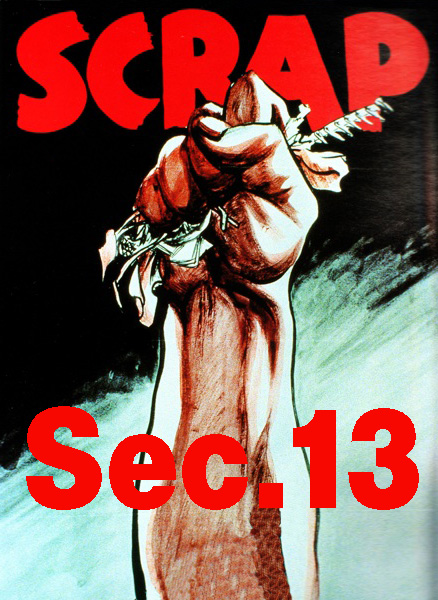Taxpayer Funded Canadian Anti- Hate Network Wants Return of Sec. 13
Sec. 13 of the Canadian Human Rights Act was inserted at the last minute, in 1977, on the request of Jewish lobby groups and the then-Deputy Attorney General of Ontario, to “get” one man, John Ross Taylor who was using a telephone answering machine with a recorded message to spread his views. This was in the late 1970s, before today’s Internet technology. Sec. 13 stated: “It is a discriminatory practice for a person or a group of persons acting in concert to communicate telephonically or to cause to be so communicated, repeatedly, in whole or in part by means of the facilities of a telecommunication undertaking within the legislative authority of Parliament, any matter that is likely to expose a person or persons to hatred or contempt by reason of the fact that that person or those persons are identifiable on the basis of a prohibited ground of discrimination.” These privileged groups included race, religion, sexual orientation or identity. Mr. Taylor and a number of others using telephone answering machines to spread their views were slapped with “cease and desist orders.” These had the force of a court order.
To broadcast the same or “similar” (whatever that is) messages was considered contempt and cold land you in jail. Happy Warrior John Ross Taylor, an honest and guileless man, was twice sentenced to a year in jail, the last time when he was 77 years of age.
By the late 1990s, the Internet had replaced telephone answer machines. Sabina Citron, a bitter enemy of revisionist publisher Ernst Zundel, made a complaint against him about the Zundelsite, which was located in the U.S. and run by an American citizen, educator and novelist Ingrid Rimland (who would eventually become Mrs. Zundel). This was a hard fought case, which lasted from 1997 to 2002. CAFE was an intervenor. On the censorship side were a number of Jewish groups. The defence argued, inter alia, that the Internet was not “telephonic communication”, as the section was then worded. Bill C-36, an omnibus anti-terrorism law covering many things was brought in as a response to 9/11. It gave control of the Internet to the Canadian Human Rights Commission and clarified that it did cover the Internet.
Along came Richard Warman, an Ottawa lawyer and bitter enemy of free speech — he had earlier tried to get various venues for British author David Icke cancelled. Warman started filing a flurry of human rights complaints against various nationalist bloggers, historical revisionists and others. For a while he was even working for the Canadian Human Rights Commission
, in a way, drumming up business for them.
Most of his victims were poor and few could afford a lawyer. CAFE assisted a number of these victims (Terry Tremaine, Glen Bahr, Jessica Beaumont, Melissa Guille, and others, and intervened in the Marc Lemire/Freedomsite case.
We witnessed a massacre. Along the way, it was ruled that truth was no defence, intent was no defence. No harm had to be proved. In one case, we proved that, prior to Warman’s complaint, only one person, anti-free speech offence hunter Richard Warman, had ever clicked on the offending comment. The wording of the Section “likely to expose” is very loose. What is “likely”? No evidence had to be presented that anyone actually saw the comments, believed them and started to hate a privileged minority. Hatred may be hard to define, but what about “contempt”? Contempt is a negative feeling toward a person.
As it turned out, ANY strong criticism of a privileged group, even if true or fair comment, could lower a person’s opinion of that group and, therefore, might “expose them to contempt.” We learned that there was no defence to a charge under Sec. 13. The anti-free speech complainants, the vast majority Warman’s, won in every case but one — a record only surpassed in North Korea. The press paid no attention to this bullzosing of freedom. Often, echoing the complainant they had demonized the victims as “neo-nazis” or “racists” or “White supremacists”.
Eventually, others decided to mimic the success of Jewish groups and Warman, who worked closely with them, to silence their critics. A group of Moslems, angry at Mark Steyn for his book on the Islamicization of Europe, which had been exerpted in Maclean’s made a Sec. 13 complaint against Maclean’s. Finally, the press paid attention and they learned that there basically was no defence to a charge and that the vast majority had been brought by one man.
Soon, religious groups began to pay attention. We had warned Real Women back in 1998 that having we their teeth on historical revisionists and immigration critics, the thought control freaks would move on to others — Christians who opposed abortion or the LGBTQ agenda. A groundswell of opposition arose to Sec. 13. A Conservative Party conference called for its repeal. A Conservative backbencher, Brian Storseth, introduced a private member’s bill repealing Sec. 13, which passed in 2014.

Warman no longer has his favourite toy. The enemies of free speech have smarted ever since. Now, the Canadian Anti-Hate Network, on whose board sits Richard Warman and Bernie Farber, former CEO of the Canadian Jewish Congress and a decades-long advocate of censorship. Sadly this frenetically pro-censorship gropup has lucked into government money. Even worse, this summer they were the beneficiary of a $500,000 grant from the Bank of Montreal. [No, corporate Canada is no friend of free speech.]
Thus free speech supporters should be concerned by the following news from the Canadian Anti-Hate Network.: “Earlier this month [December] we met with Heritage minister Steven Guilbeault and a number of social justice organizations to discuss legislation surrounding online hate. We argued that reinstating s. 13 is fundamental to successfully dealing with the problem. We were joined by numerous voices in support of these measures — the Mosaic Institute, the National Association of Friendship Centres, the Chinese Canadian National Council for Social Justice, and others — and we are committed to a coalition to realize a better solution for today.” The problem was views on the Internet dissenting from political correctness.

